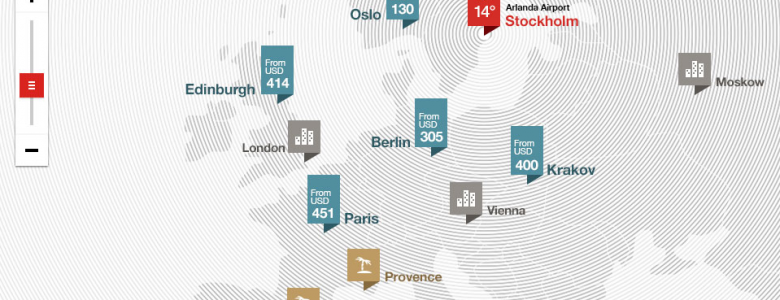
Airline websites have long been complicated, clunky and slow, jam-packed with travel jargon and promotional clutter. We hear clients complain on a daily basis of how they couldn’t find the right information or even make a successful booking on airline websites. Granted, some carriers have gotten it vaguely right, but many still fall seriously short of the mark.
This is exactly what digital design agency Fi (pronounced “F I”) believes too and they think that there can be so much more that airline websites (and not doubt, online travel agencies too) can offer their customers in the planning and booking experience. They’ve proposed a rather suave looking site which provides information and images on destinations, prices, route-planning, hotel booking, online check-in and arrival & departure information.
The only snag: they’re not the first to think that travel should be simpler and they’re not the first to propose an inspirational search tool with big images and all-inclusive prices. There have been a plethora of sites like these such as Aircube and Escapeflight with the most famous probably being Wanderfly who were bought by Tripadvisor and shut shop this week. This hints at Tripadvisor looking to further it’s dominance into the travel planning and booking world.
Many more of these sites have not survived though and I wanted to briefly shed some light on some of the complex reasons why.
The lowest common denominator
What first world designers need to remember is that not everyone is using first world internet connections, particularly people who travel. This can be a KLM customer booking online from rural Bagamayo in Tanzania to a British Airways customer trying to check-in online via a shaky 3G connection in Costa Rica. If the choice is going to be between big pretty images which cause a page to time-out on slow connections and a stripped-down, graphic-less page where a customer is going to be able to book regardless of their connection speed, the airlines will go with the latter.
Flight booking is complicated
It’s crazy complicated, as in bordering on the absurd. There were many different airlines developing their own booking systems concurrently and each airline works to a different set rules on how its tickets can be purchased, amended and refunded. Some of these systems are networked via one of 4 central reservation systems, others are not. Each airline is in control only of it’s own inventory (numbers of tickets available at each different price) except in the case of agreements with other airlines known as “codeshares”.
Each airline uses different designators, known as booking classes, in order to categorise the tickets too and there are around 10 different booking classes in economy class alone. Add to this that each airline charges different amounts for tickets booked in each booking class dependent on the route and date of travel and that they can change availability of that class at any moment and that you can combine different booking classes to make different fares, the situation just gets incomprehensible.
Each airline only sells their own flights
And just for some extra complication: each airline sells only tickets on it’s own planes. There are agreements (see codeshares mentioned above) where they sell tickets on other planes, but this won’t help you if you’re travelling Stockholm – Zurich – Barcelona and then want to add Rome at the end. This would have you travelling back to Zurich between Barcelona and Rome and you’d only be able to make this exact booking with Swiss (which is why you use an agnostic flight-booking site or agent which allows booking on multiple airlines).
The final straw? Hotels
Hotels are even less centralised than airlines when it comes to using global booking systems and while some of the airline distribution systems try to list them, many airlines have gone with independent tools provided by online travel agencies. Also, hotels have only so many rooms and thousands of agencies and websites trying to book these at any one moment. This makes displaying up-to-the-minute availability and pricing imperative. Now bearing in mind that flights and hotels use different distribution systems, they both need to cache prices based on recent searches as calling info like that from these systems each and every time a search is done will slow the booking process down immensely.
This doesn’t mean this type of search is useless, it just means it’s better as inspiration, rather than a hardcore replacement for booking systems in place currently. This is evidenced by airlines like Easyjet creating a separate page for this and Lufthasa creating a special iPad app. They don’t hate this kind of search, they just don’t want it interfering with their core business.
My verdict
Fi has a very pretty concept which in an ideal world would make travel booking a much better experience if it replaced current systems. Their design is an awesome, romantic vision for travel booking, unfortunately reality is just too messy to fix with a good front-end design like this.